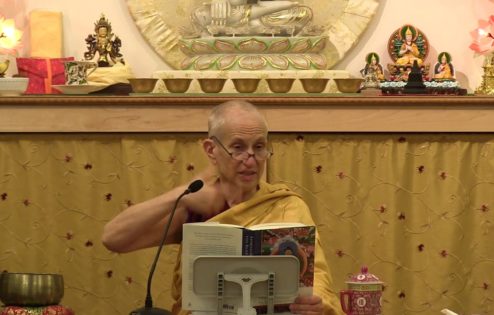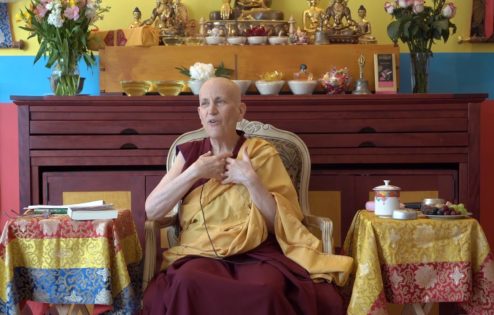ethical conduct
Teachings on ethical conduct, a fundamental Buddhist practice that is based on avoiding harmful actions and engaging in constructive actions.
Latest Posts
View all posts in Venerable Thubten Chodron's teaching archive.

Spiritual confidence in the workplace
What it means to integrate spirituality with work including our motivation to work, keeping ethical…
View Post
How to practice Dharma: a talk for youth and parents
Relating Buddhist teaching and practice to issues faced by teens and parents—becoming the person you…
View Post
Science and gender equality
Covering the sections in Chapter 12, “Science” and “Gender Equality."
View Post
Consumerism and the environment
Continuing Chapter 12, covering the sections "Consumerism and the Environment," "The World of Business and…
View Post
Engaged Buddhism and political involvement
Continuing Chapter 12, covering the sections “Using Diverse Methods to Benefit Others” and “Engaged Buddhism…
View Post
Willingness to undergo hardship
Finishing Chapter 11, by covering the sections “Willingness to Undergo Hardship,” “Keeping a Happy Mind,”…
View Post
Creating the causes for happiness
Teaching on creating the causes for happiness, disadvantages of self-centered thought, and dependent arising.
View Post
The importance of ethical conduct
Emphasizing the importance of ethical conduct to secure a precious human rebirth, and explaining the…
View Post
Paths for spiritual development
Beginning Chapter 8 “A Systematic Approach” and covering the section “Paths for Spiritual Development” explaining…
View Post
“Letter to a Friend”: Verses 35-42
Venerable Thubten Chodron covers verses 35-42 of Nagarjuna's "Letter to a Friend."
View Post
“Letter to a Friend”: Verses 29-34
Venerable Thubten Chodron covers verses 29-34 of Nagarjuna’s “Letter to a Friend.”
View Post